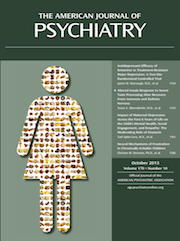Impact of Maternal Depression Across the First 6 Years of Life on the Child’s Mental Health, Social Engagement, and Empathy: The Moderating Role of Oxytocin
Abstract
Objective
Maternal depression across the postbirth period has long-term negative consequences for infant development. Little is known of the neurobiological underpinnings, but they could involve oxytocin, a neuropeptide that is dysfunctional in depression and is implicated in birth and parenting.
Method
The authors recruited a community cohort of women with high or low depression scores 2 days after childbirth and measured depression again at 6 and 9 months. When the child was 6, the authors evaluated the families of 46 chronically depressed mothers and 103 mothers reporting no depression since childbirth. The child was assessed for psychiatric diagnoses, social engagement, and empathy. Mother, father, and child were tested for salivary oxytocin level and variation in the rs2254298 single nucleotide polymorphism on the OXTR gene.
Results
Of the children of the chronically depressed mothers, 61% displayed axis I disorders, mainly anxiety and oppositional defiant disorder, compared with 15% of the children of nondepressed mothers. In the depressed mothers’ families, salivary oxytocin was lower in mothers, fathers, and children, and the children had lower empathy and social engagement levels. The rs2254298 GG homozygous genotype was overrepresented in depressed mothers and their families, and it correlated with lower salivary oxytocin. Presence of a single rs2254298 A allele (GA or AA genotype) in depressed mothers markedly decreased risk of child psychopathology.
Conclusions
The negative effect of chronic maternal depression on child social outcomes was related to genetic and peripheral biomarkers of the oxytocin system. This suggests a potential for oxytocin-based interventions.



